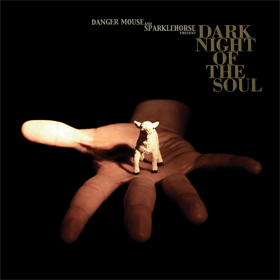Once upon a time, it was perhaps fair to say that anthropomorphic nom-de-guerres were all Danger Mouse and Spaklehorse had in common. Since coming to the attention of a small but devoted audience as a member of Danger Mouse and Jemini (remember him?), the prolific Brian Burton has navigated his way from hip hop producer du jour to chart-topping personality with ease. His willingness to blend into the wallpaper of someone else’s project, appear as a celebrity name to drop, or assume other musical forms makes him a very modern kind of megastar.
Therefore very few other artists (save perhaps Damon Albarn, who worked with DM on The Good the Bad and the Queen), could attract the abundant cast list assembled for Dark Night Of The Soul. Making appearance are musicians including The Flaming Lips, Black Francis, Julian Casablancas, Iggy Pop, Suzanne Vega and former Grandaddy leader Jason Lytle. This impressive collection notwithstanding, the biggest collaborative coup has to be one David Lynch, who contributes vocals to one of the tracks. And that’s not all…
For Lynch has created a book to accompany the music. Each double page spread in the hand-numbered, limited edition tome features evocative imagery juxtaposed against cryptic quotes. At first turn of the page, the strinking, stark and dimly lit photographs suggest something as bleak and unsettling as the walls of Goya’s membrane. There is a temporary reprieve from the melancholy for some of the book, but much like Lynch’s cinematic work it at times threatens to make sense and even seem accessible… only to pull the rug out from under your feet.
As well as this sensory overload of media and glitterati, it’s the tragic suicide of Sparklehorse’s Mark Linkous that casts a shadow over Dark Night of the Soul. In a curious twist of nomenclature, it recalls the pall the Dark Knight Batman film lay under after the death of Heath Ledger. That too saw the inevitable rubbernecking that accompanies the passing away of someone in the public eye, and in Ledger’s case even extended as far as a dubious posthumous Oscar. Thankfully, this project can be judged on its own merits.
For musically, Dark Night Of The Soul more than passes muster, and there are one or two extraordinary moments. ‘Grim Augury’, performed with Vic Chesnutt (who also passed away last year) is hypnotic and strange, while ‘Revenge’, sung by Wayne Coyne, is understated and moving, its ethereal mood becoming more pronounced with each listen. There’s not a bad song here, though admittedly some would be less bewitching without the accomplished and assured trip-hoppy production. What’s more, it beautifully complements the lucid, dreamlike hinterland conveyed by Lynch’s pictorial accompaniment. The project does no harm to, and even enhances, the already monstrous acclaim afforded Lynch, and to a lesser extent Danger Mouse. It’s not likely to make much difference one way or another to Mark Linkous, but to his fans – and they are numerous – it will be a comfort that he helped bring another wonderful record into the world.


